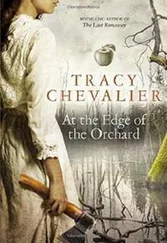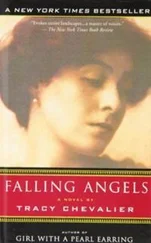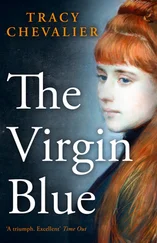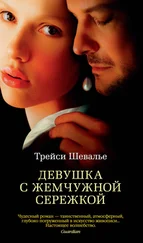– My hair is gone, she whispered through tears, even then understanding that she should say nothing to the others. Isabelle glanced at Etienne, Hannah and the boys. Except for Hannah's sour expression, nothing in their faces suggested suspicion.
She was helping Marie search the tree again when she looked up and saw a bird's nest glinting in the sun.
– There! she pointed. Marie laughed and began to clap her hands.
– Take it! she cried to the birds, holding her hair up by the ends and letting it drop in a slow cascade. Take it, it's yours! Now I will always know where it is.
She spun in a circle and fell to the ground laughing.
The high-pitched whistle rose and fell before ending in a bird-like trill. It was heard all the way along the valley. After a time the rattles and jingles and creaks of a cart could be heard, bouncing off the rocks high above to reach them in the fields they were planting with flax. Etienne sent Jacob to find out what was coming. When he returned he took Isabelle's hand and led her, the rest of the family following, along the path to the edge of the village. There the cart had stopped, surrounded by a crowd.
The pedlar was short and dark, with a beard and a long moustache curled into elabourate whorls, and a red and yellow striped cap shaped like an upside-down bucket pulled over his ears. He perched high above them on a cart heaped with goods, swinging and climbing over it with the assuredness of a man who knows every toehold and hand-grip. As he climbed he talked non-stop over his shoulder in a strange singing accent that made Isabelle smile and Etienne stare.
– Oranges! Oranges! I show you oranges, olives, lemons from Sevilla! Here is your beautiful copper pot. And here your leather bag. And here your buckles. You want buckles on those shoes, fair lady? Yes, you do! And I give you buttons to match! And your thread, and your lace here, yes, your finest lace. Come, come! Come look, come touch, don't be afraid. Ah, Jacques La Barbe, bonjour encore! Your brother says he comes from Geneva soon, but your sister he says stays near Lyons. Why she does not join you here in this lovely place? Never mind. And Abraham Rougemont, there is a horse for you ready in Bienne. A good buy, I saw it with these my eyes. You give that pretty daughter of yours a ride around the village. And Monsieur le régent , I meet your son -
On and on he talked, passing on messages while selling his goods. People laughed and teased him; he was a familiar and welcome sight, arriving every year after the worst of the winter and again during the harvest festival.
In the middle of the excitement he leaned over to Isabelle.
– Che bella , I have not seen you before! he cried. You come and look at my things? He patted the rolls of cloth next to him. Come look!
Isabelle smiled shyly and bowed her head; Etienne frowned. They had nothing to trade with, less than nothing, for they owed favours to everyone in Moutier. On their arrival they had been given two goats, a small sack each of flax and hemp seeds, blankets, clothes. There was no need to pay anyone back, but they were expected to be as generous when the next refugees arrived with nothing. They stood for a long time watching the purchases, admiring the lace, the new harness, the white linen smocks.
Isabelle heard the pedlar mention Alès.
– He might know, she whispered to Etienne.
– Don't ask, he hissed.
He doesn't want to know, she thought. But I do.
She waited until Etienne and Hannah had left, and Petit Jean and Marie had tired of running round and round the cart and had gone off to the river, before she approached him.
– Please, Monsieur, she whispered.
– Ah, Bella , you want to look! Come, come! She shook her head.
– No, I want to ask – you have been to Alès?
– At Christmas, yes. Why, you have a message for me?
– My sister-in-law and her husband are there – might be there. Susanne Tournier and Bertrand Bouleaux. They have a daughter, Deborah, and maybe a baby, if God wills.
For the first time the pedlar was quiet, thinking. He seemed to be searching through all the faces and names he had seen and heard in his travels and stored in his memory.
– No, he said at last, I have not seen them. But I look for them for you. In Alès. And your name?
– Isabelle. Isabelle du Moulin. And my husband, Etienne Tournier.
– Isabella, che bella . A perfect name I will not forget! He smiled at her. And for you I show you the perfect thing I have, the special thing. He lowered his voice. Très cher -I do not show this to most people.
He led Isabelle round his cart and began to dig among bundles of cloth until he pulled out a bale of white linen. Jacob appeared at Isabelle's side and the pedlar motioned to him.
– Come, come, you like to look at things! I see your eyes looking. Now look at this.
He stood over them and shook out the white cloth. Out fell the fourth secret, the colour Isabelle had thought she would never see again. She cried out, then reached over and rubbed the cloth between her fingers. It was a soft wool, dyed very deep. She bowed her head and touched the cloth to her cheek.
The pedlar nodded.
– You know this blue, he said with satisfaction. I knew you know this blue. The blue of the Virgin of Saint Zaccaria.
– Where is that? Isabelle smoothed the cloth.
– Ah, a beautiful church in Venezia. There is a story to this blue, you know. The weaver who made this cloth modelled it after the robe of the Virgin who is in a painting in Saint Zaccaria. This was so to thank her for the miracle.
– What miracle? Jacob stared at the pedlar with wide brown eyes.
– The weaver had a little daughter he loved, and one day she disappeared, as children often do in Venezia. They fall into the canals, you see, and they drown. The pedlar crossed himself.
– So the little daughter did not come home and the weaver, he went to Saint Zaccaria to pray for her soul. He prayed to the Virgin for hours. And when he goes home he finds his daughter there, all alive! And in thanks he makes this cloth, this special blue, you see, for his daughter to wear and live safely forever in the Virgin's care. Others have tried to copy it but no one can. There is a secret in the dye, you see, and only his son knows now. A family secret.
Isabelle stared at the cloth, then looked up at the pedlar, tears in her eyes.
– I have nothing, she said.
– For you, then, Bella , I give you a little something. A gift of blue.
He bent over the cloth and from a frayed end pulled off a piece of thread the length of her finger. With a deep bow he presented it to her.
Isabelle often thought about the blue cloth. She had no way of buying it; even if she did Etienne and Hannah would not allow it in the house.
– Catholic cloth! Hannah would mutter if she could speak.
She hid the thread in the hem of her dress and brought it out only when she was alone or with Jacob, who used words sparingly and would say nothing about the bit of colour they shared.
Then one of their goats had a hidden kid and Isabelle had one last secret to keep.
The goat had given birth to two kids, licked them clean, nursed them, slept with them pushed against her swollen udder. When Isabelle left the fields to check on her she noticed the red membrane of another head pushing out. She pulled out the tiny body, saw that it was alive and set it in front of the goat to clean. As the new kid fed Isabelle sat and watched it and thought. Her secrets were making her bold.
The woods around Moutier were so big that she knew of places where no one went. She took the kid to one of these spots, built a shelter of wood and hay, fed it and looked after it for a whole summer without anyone knowing.
Читать дальше
Конец ознакомительного отрывка
Купить книгу
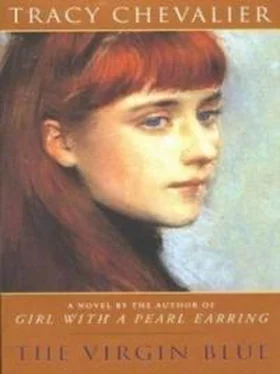
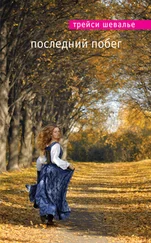
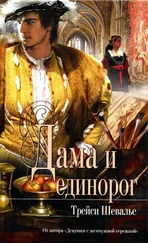
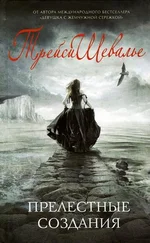
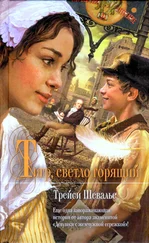
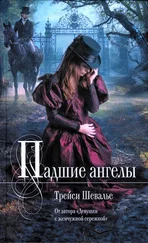
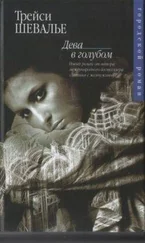
![Трейси Шевалье - Тонкая нить [Литрес]](/books/386177/trejsi-shevale-tonkaya-nit-litres-thumb.webp)
